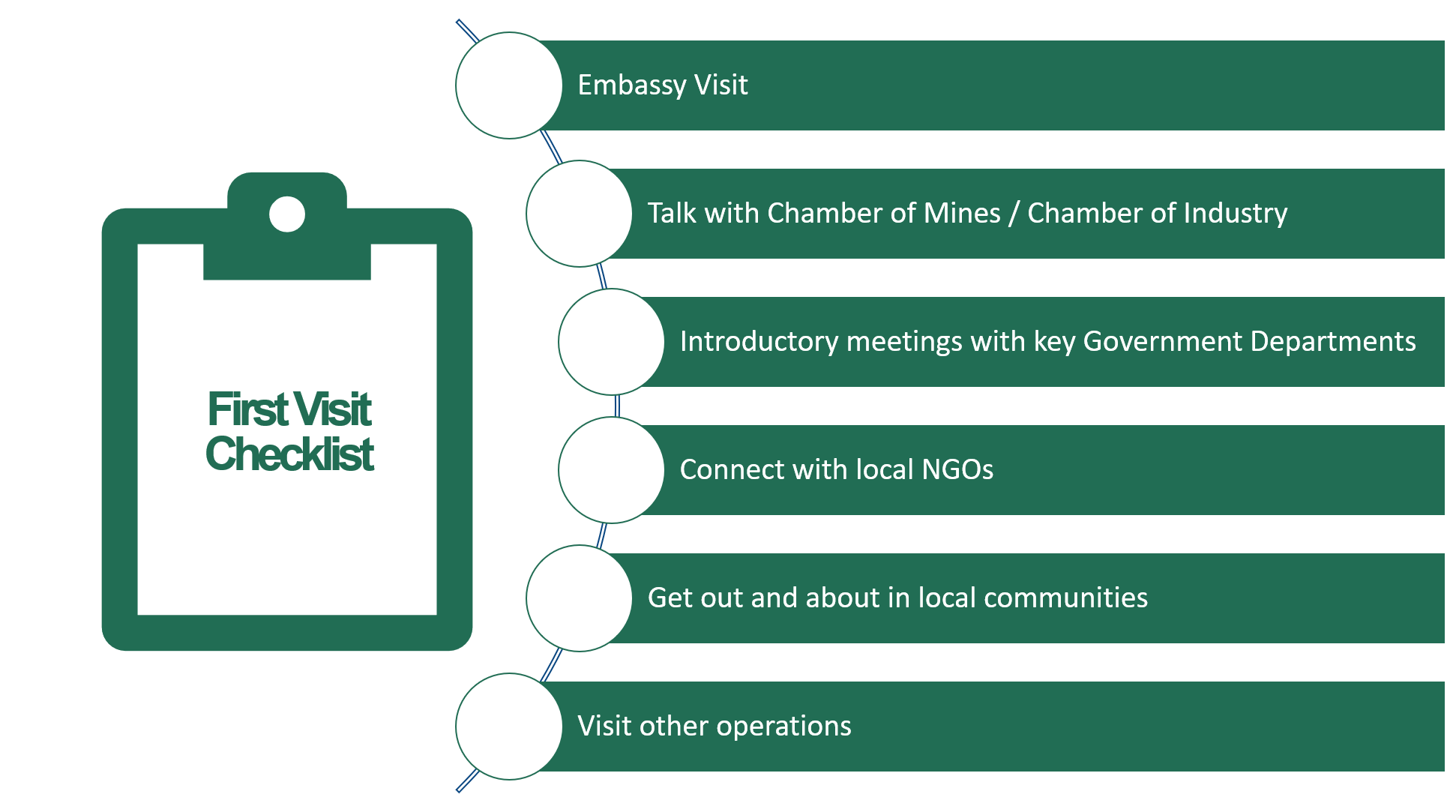Making the most of your first site visit
Insights | 6 August 2023

If you're working on an overseas project and have never visited the site you'll be well served to make some pre-departure arrangements ahead of your first visit so that you can tick off the actions on your "what do I need to get out of my first visit checklist"
You also need to make sure you have a clear mandate from your boss and a shared understanding of what you can and cannot commit to on behalf of the company.

- Visit your home-country Embassy. It is their job to help companies on their way and they should be able to provide advice on what is happening in the country, who are the real players and what are the local sensitivities.
- The Chamber of Mines and / or Chamber of Commerce can provide a look into the experiences of other companies, the legal framework for operating in the country and legislation related to exploration, land rights and land title.
- Schedule introductory meetings with key government departments. Planning, health, education and police are a good place to start, as is the head of local government. Provide some information about the project – it doesn’t need to be too specific, whatever the company is comfortable with sharing – and ask how they feel about the company and what they think the project will do for them. The more levels engaged with – national, regional and local – the better, but if time is short, focus at the local level for the first visit and expand the circle during subsequent visits.
- Connect with NGOs working in country and particularly any that are working locally. They generally have a good idea of local community dynamics and can provide a triangulation point for what the site team is saying. They could also be potential partners for social investment activities so it is worth starting early to understand where interests may overlap.
- Take a few hours to visit the local communities. Get out of the car and walk around and talk with a cross section of people such as elders, business owners, women and youth. Ask them how they are. Listen to them. Be willing to sit down and talk. In conversations ask specifically, “What are the impacts on your life of the company being here? What are the pluses, the positive impacts for you? What are the downsides, the negative impacts that concern you? What do you suggest the company could do to make sure that it sustains the positives and begin to address some of these negatives?” Doing this sends the message that the company is not afraid of and distrustful of local people, that it wants to hear and learn from local ideas and that it respects the holders of those ideas and that it is willing to be held accountable for company impacts. Also, you will probably hear some very important concerns and some surprisingly positive ideas. Many local people do have ideas and many of these contain elements of solutions that may not be imagined from inside the company office.
- Visit other operations to see how they address the various social aspects, what has worked for them and what has not worked.
- Listen and look for signs that indicate the quality of the company’s relationships. There are two simple ways to do a quick reality check. The first is to pay attention to the tone of meetings with government agencies, partners and community members. If they are tense, unfriendly, demanding and accusations are flying about it isn’t hard to work out things are heading in the wrong direction. On the other hand, a friendly welcome and a sense of shared purpose say that you are doing okay. The second is to note behaviours and attitudes you see and hear.

Noting these same signs on repeat visits can help you to see trends over time - for better or worse - and is an easy way to get a feel for how your relationships with local people are travelling. If you are seeing the early signs that things are heading off the rails you are in a much better position to get back on track than would otherwise be the case.
When all is said and done, the more advice, views and ideas you can gather early on the better informed you’ll be and the less likely it is that you'll make costly mistakes.
Post a Comment